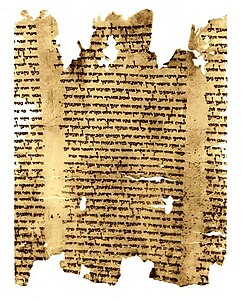|
Isaiah 57
Isaiah 57 is the fifty-seventh chapter of the Book of Isaiah in the Hebrew Bible or the Old Testament of the Christian Bible. This book contains the prophecies attributed to the prophet Isaiah, and is one of the Books of the Prophets. Chapter 57 is the second chapter of the final section of the Book of Isaiah, often referred to as Trito-Isaiah.[1] TextThe original text was written in Hebrew language. This chapter is divided into 21 verses. Textual witnessesSome early manuscripts containing the text of this chapter in Hebrew are of the Masoretic Text tradition, which includes the Codex Cairensis (895), the Petersburg Codex of the Prophets (916), Aleppo Codex (10th century), Codex Leningradensis (1008).[2] Fragments containing parts of this chapter were found among the Dead Sea Scrolls (3rd century BC or later):
There is also a translation into Koine Greek known as the Septuagint, made in the last few centuries BCE. Extant ancient manuscripts of the Septuagint version include Codex Vaticanus (B; B; 4th century), Codex Sinaiticus (S; BHK: S; 4th century), Codex Alexandrinus (A; A; 5th century) and Codex Marchalianus (Q; Q; 6th century).[3] ParashotThe parashah sections listed here are based on the Aleppo Codex.[4] Isaiah 57 is a part of the Consolations (Isaiah 40–66). {P}: open parashah; {S}: closed parashah.
Israel's futile idolatry (57:1–13)Verses 1–2 contain awkward shifts between singular and plural, contrasting a group whom the prophetic tradition approves and others who are strongly condemned.[5] Those being detested get more detailed attention with their parentage attacked (verse 3), their behavior deemed childish (verse 4) and their evil practices spelt out at length, including sexual offences as well as child-sacrifice (verse 5), which were regarded idolatrous (recalling the continuous danger of prostitution of the city described in Isaiah 1:21–23).[6] Verses 11–13 continue the condemnation, ending with a 'mockery of idols' resembling that in chapters 44 and 45, but also assert the 'impregnable position of those who take refuge in YHWH'.[7] Verses 1–2
These verses complain the (apparently violent) death of the righteous that went 'unnoticed and unlamented'.[11] Verse 13
The concluding promise, typical in Isaiah's polemic, is addressed to those who trust in the Lord (cf. Isaiah 30:18) who would 'gain title to land and control of the Jerusalem Temple'.[13] Healing for the contrite (57:14–21)The double imperative in verse 14 recalls the series of such usages in chapters 49–55 to indicate the consoling contents of this section ending with an assurance of God's continuing presence with the contrite and humble, a strong contrast with the earlier passage.[7] Verses 19–20 provide a clear distinction between those accepted by God and 'the wicked', and the refrain, also found in Isaiah 48:22, fits naturally into its context.[7] Verse 14
Verse 15
God's presence with the 'downtrodden and marginalized' (Isaiah 66:1–2) is associated with God's transcendence in Isaiah's vision ('the high and lofty one... whose name is Holy'; cf. Isaiah 6:1–5).[7][17] Verse 17
Verse 19
Peace is offered to them that are 'nigh' ("near"), and to them that are 'afar off', applied by Paul as "not only to the Jew, but also to the Gentile" in Ephesians 2:13; 2:17 (cf. Acts 2:39).[21] See also
References
Sources
External linksJewishChristian |
||||||||||||||||||

